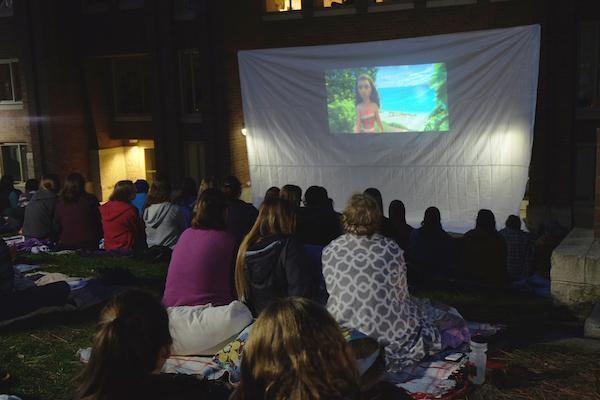The administration’s decision last week to end the university’s formal relationship with Planned Parenthood created a passionate stir across campus, social media and Spokane, and reached national news organizations. As the administration and the Whitworth community move forward to contemplate the ramifications and later effects of the separation, the educational goals and student life activities of students should be closely examined.
The problem with this decision is not necessarily the fact that the university took a side, although many would and have argued that this is a problem. The university is constantly pressured to make decisions like this one, in which both sides of the argument believe firmly that they have the moral high ground. Sometimes the administration takes a side and sometimes it doesn’t; in this case it did.
The problem we at the editorial board feel is most significant to students is the infringement on their rights as students that this decision presents. The decision to disallow the club from associating with national organization Planned Parenthood, and to prevent students from interning at the organization, involves the university’s stance on a matter in students’ lives, which is not OK.
The Students for Life club, which was chartered about five years ago, receives brochures, educational tools, support and speaker opportunities from their national organization partner, Students for Life of America. Generation Action, a pro-choice group, attempted to charter in December but was denied by Student Life due to the club’s desire to partner with Planned Parenthood.
Once a club proposal is approved by club chartering committee it is sent to Rhosetta Rhodes, vice president for student life and dean of students, for approval before the ASWU assembly votes to charter the club.
“It’s almost always a rubber stamp, but it goes to [Rhodes] for approval. Generation Action was passed through ASWU [club council] originally, it stopped at the administration,” said ASWU financial vice president Jeff DeBray in last week’s ASWU meeting.
Student life and administration’s intervention in the chartering process raises questions over the breadth of the administration’s power over ASWU and student activities. The ASWU Bylaws state the vice president of student life “must also agree with the proposed charter before moving on to the assembly for a vote.” However, the Bylaws do not outline why student life, an entity outside ASWU, has approval or veto power over clubs.
Aside from providing a “rubber stamp” for club charters, Rhodes has little involvement with ASWU and student organizations. A position more closely tied with students, such as the assistant dean and director of student activities, that attends ASWU meetings, works closely with the student government members and oversees student events and clubs would be able to make more informed decisions about the best route for student groups.
ASWU has devoted time in multiple meetings this year to discussing constituency reports and reports from senators that address a range of groups on campus feeling pushed aside, unheard or unaccepted on campus. It is the job of ASWU execs to relay those issues to Rhodes and other administrators who were not present at the meetings, but someone present during those discussions may have made a more informed decision on the chartering of a club looking to promote more conversation on campus.
ASWU Club Chartering Committee’s approval of Generation Action signaled that the group was not in violation of the university’s “standards of conduct, or conflict with the mission, policies, practices, or goals of the university,” which ASWU outlines in its club chartering policy.
The administration’s decision last week to end the university’s involvement with Planned Parenthood communicates the “policies, practices, or goals of the university” needed to be altered in order for Generation Action to be in violation of university standards and not be chartered. While President Beck Taylor branded the announcement as Whitworth becoming neutral on a politically charged topic, the choice pushed the university’s beliefs toward one side of the debate.
ASWU also maintains that approval of a student organization “no way implies consent or endorsement of the positions or points of view espoused publicly or privately by members of the organization.” While ASWU was able to make the distinction between chartering a club and making an endorsement, the administration failed to examine how student organizations provide opportunities for dialogue and student involvement, not political statements.
“The idea that a Christian university would partner with an organization that provides, among other things, abortion-related services is understandably difficult for some to reconcile,” Taylor wrote in the email announcement last week. However, the choice to pull away from one side while continuing to support SFL’s affiliation with their national organization communicates Whitworth’s allegiance with one side of the debate.
Creating the space for a diversity of opinions and experiences, which Taylor expressed the university will continue to do despite the decision, would allow for students to interact with both sides of an issue and make an informed choice about their personal views. Stopping a club from providing resources and a platform for students to experience new ideas diffuses the possibility for that diversity. Even if the university itself holds one position, should that mean all its students and student groups should as well? Of course not. That is where the diversity of opinions comes in. ASWU exists to serve the student body, not the university donors.
“We talked about equity in my political science class today,” freshman Lacy Nguyen said in last week’s ASWU meeting according to the meeting minutes. “The Young Americans for Freedom and Students for Life [clubs] are affiliated with national organizations. Generation Action is not allowed to be affiliated [with Planned Parenthood]. I wonder, and heard from students, what is equitable? There is a question of what clubs can get what? Should we cancel all associations with national organizations?”
A chartered club has the ability to request funding from ASWU, reserve campus facilities, post flyers and banners on campus to advertise meetings and events, advertise on Whitworth.fm and The Whitworthian at a reduced rate, take part in club fairs and be included in ASWU club mailing lists and information for students. Unchartered clubs cannot use Whitworth or ASWU’s name, equipment, grounds or funds.
The news of Generation Action’s denial led many within ASWU to suggest the club rename, rebrand and recharter. While Generation Action regroups, SFL continues to receive the benefits of being a chartered club and its partnership with Students for Life of America. SFL’s relationship with and support from their national organization allows SFL to provide students with brochures, flyers, club members with information about their goals and values, along with bringing in speakers and events to campus.
SFL will welcome Kristan Hawkins, president of Students for Life of America, on May 9 to present a speech advertised as “Feminism and Planned Parenthood.” While all advertisements posted on campus must be approved by the Info Desk, the ASWU club manual does not specify if Rhodes or ASWU approves speakers, brochures, handouts, table tents, banners, events or social media posts. ASWU’s club manual requests all clubs comply with university policies and standards, but regulation of those guidelines appear lax when national or regional organizations’ material are passing through campus without oversight.
The issue comes down to this: Despite claiming to desire a diversity of opinions, the university not only gives preference to groups with certain opinions, but prevents other groups with differing opinions from forming and having access to the same benefits. This in itself undermines the very concept of a diversity of opinions.
Editorials in the “In the Loop” section reflect the majority opinion of the Editorial Board, comprised of five editors.
Contact Katie Shaw, the opinions editor, at kshaw17@my.whitworth.edu










 Spokane?
Spokane?